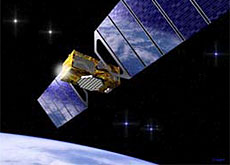Seed funds for Swiss space tech transfer firms

A new seed stage venture capital fund of €50 million has been launched by the European Space Agency.
Its goal is to give help at an early stage to those wanting to start new ventures based on technology developed for space research – Swiss teams are invited to participate.
As a long time member of ESA, Switzerland has completed a great deal of research and development in space technologies.
In fact, some 60 project teams are currently participating, according to Hugo Wyss, who is the board of a number of science parks in Switzerland and who has been promoting entrepreneurialism here for over 25 years.
There are already seven projects that look like good candidates, according to Wyss. More are welcome to apply.
“We are soliciting business proposals from people interested in establishing a new venture in Switzerland to transfer technology to non-space markets – it can be a Swiss or foreign group willing to set up its business in Switzerland,” he said.
It is all part of a program called the European Space Incubators Network (ESINET), which will make available € 50,000 to €300,000 seed capital to new companies, plus it will offer support such as business coaching and marketing assistance.
Projects are assessed based on competition, stage of commercialization, market size, and business applications.
The types of companies targeted are those able to transfer space technology to one of four market applications, including navigation, telecommunication, environmental technologies, or those that use ESA infrastructure and experiments, such as zero gravity biology studies.
Wyss expects the Technopark in Zurich to join Y-parc in Yverdon, which is the first site to offer ESINET incubator services here.
Spinning off space tech
Space research has long been a source of innovations for everyday life. NASA set the trend, making fuel cells, powdered orange drink mixes, and power tools accessible to consumers.
Now the European Space Agency along with the European Union is following suit. In fact, it already has somewhat of a track record, saying it has passed on some 150 technologies to the non-space sector, creating 20 new companies and around 2500 new jobs in Europe.
Turnover based on these spinoffs in the space and non-space sectors is expected to reach around €1 billion by the end of 2004, according to ESA’s technology transfer office.
ESINET is Europe’s first network of space business incubation centres which currently includes 30 incubators in 12 European countries.
With 33,000 employees and an annual turnover of €5.5 billion, the space sector generates many technologies and systems, which can be used by entrepreneurs to develop new products and new value-added services for use in the non-space sectors, say ESINET organisers.
Swiss in space
Over the years, Swiss companies, such as Ascom, Ruag (which recently acquired aerospace manufacturers HTS AG) and Contraves Space, have been active in the ESA.
The universities have also been active, including the Swiss Federal Institutes of Technology at Lausanne and Zurich and the University of Bern, as well as CERN and the CSEM.
In related news, the ESA is soon to begin work on the new €3.5 billion Galileo satellite network, which has been compared to Airbus and the Ariane space launcher partnership in its importance to the European economy.
In fact, it could be more important according to study performed by PriceWaterhouseCoopers on behalf of the project team.
The technology underlying Galileo – which will be a great improvement on current satellite positioning systems – is all about perfect timing, so it should be no surprise that Swiss companies are contributing in a big way.
According to research by Swiss Venture, companies which are participating are TemexTime in Neuchatel, Jast in Lausanne, and Nemerix in Manno. Many more Swiss firms and research groups are expected to join.
By Valerie Thompson

In compliance with the JTI standards
More: SWI swissinfo.ch certified by the Journalism Trust Initiative










You can find an overview of ongoing debates with our journalists here . Please join us!
If you want to start a conversation about a topic raised in this article or want to report factual errors, email us at english@swissinfo.ch.